News & Stories
2016
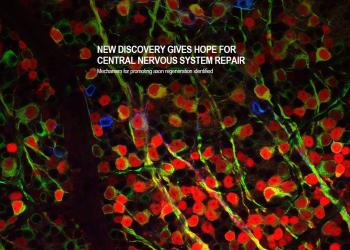
News
New Discovery Gives Hope for Central Nervous System Repair
HKUST scientists along with colleagues from the Institute of Neuroscience in Shanghai and Sun Yat-Sen University in Guangzhou have discovered a strategy for repairing injured neurons through the regeneration of axons, a normally rare occurrence. This raises the exciting possibility of reversing injuries to the central nervous system.
Led by Dr. Kai Liu, Assistant Professor at HKUST’s Division of Life Science, the team recently demonstrated that damaged optic nerves that transmit visual information from neurons in the eye to other neurons in brain could regenerate when treated with either an optical or a chemical stimulant. In mouse experiments they achieved this through the overexpression of both the light-sensing molecule melanopsin and that of Designer Receptor Exclusively Activated by Designer Drugs (DREADD), a tool normally used to enhance neuronal activity.
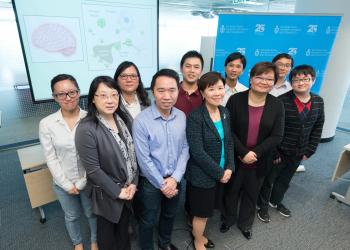
News
Breakthrough Discoveries at HKUST Offer New Hope for Treatment of Alzheimer's Disease
A research team led by scientists from the Hong Kong University of Science and Technology (HKUST) has discovered that a protein found in the human body could be potentially developed as an effective treatment for Alzheimer’s disease (AD).
The team, led by Prof Nancy Ip, Dean of Science, Director of the State Key Laboratory of Molecular Neuroscience and The Morningside Professor of Life Science at HKUST, in collaboration with Prof Eddy Liew from the University of Glasgow and Prof Baorong Zhang from Zhejiang University, has found that the protein interleukin-33 (IL-33) ameliorates cognitive decline and Alzheimer's disease-like pathology. The groundbreaking study was conducted at HKUST and the results have just been published in the prestigious scientific journal, Proceedings of the National Academy of Sciences USA (PNAS).
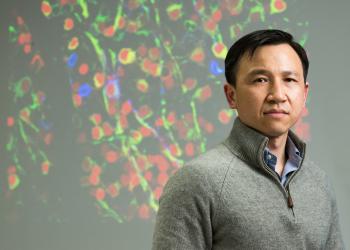
News
HKUST Scientists Discover New Measures to Facilitate Neural Repair
Damage to axons in the central nervous system (CNS) typically results in permanent functional deficits. If injured neurons can regenerate sufficient number of axons, the CNS may recover and overcome such functional deficits. A research team led by Prof Kai Liu, Assistant Professor from the Division of Life Science at the Hong Kong University of Science and Technology (HKUST), has recently discovered a novel strategy to promote axonal regeneration of injured neurons, which could inspire new directions for CNS repair research, including spinal cord injuries. The findings were published in the journal Proceedings of the National Academy of Science on 16 February 2016.
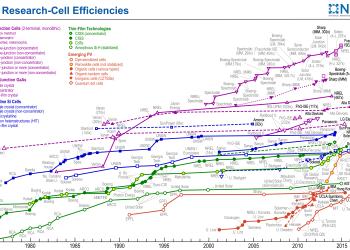
News
HKUST Develops Environmentally Friendly Organic Solar Cells with Record Performance
A record-efficient organic solar cell developed by a research team of the Hong Kong University of Science and Technology (HKUST) via an environmentally-friendly method, has been put on the renowned “Best Research-Cell Efficiencies Chart” by the National Renewable Energy Laboratory of the United States, the first time a solar cell developed by a Hong Kong institution appears on this historic chart, which records all the best efficiency cells around the world over the past 40 years.
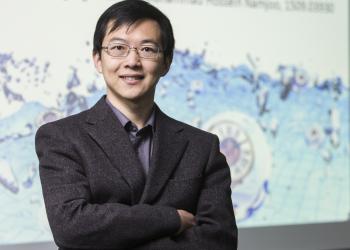
News
HKUST-Harvard Scientists Discover Ways to Clock the Beginning of the Universe
Scientists from HKUST and Harvard-Smithsonian Center for Astrophysics discovered a method to observationally distinguish different theories of how the universe first began at its very early stage. The findings were accepted by the Journal of Cosmology and Astroparticle Physics.
The expansion of our current universe has been established for almost a century. However, concerning much earlier stages of our universe as how it began has always been a topic of contention among scientists. The most widely-accepted theory of the primordial universe is cosmic inflation, during which the universe was expanding at an extremely fast and mounting rate. On the other hand, there are also contending theories which believe that our infant stage universe was fast contracting, slowly contracting, static or slowly expanding.
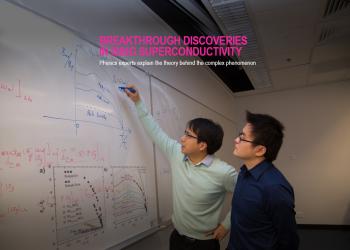
News
Breakthrough Discoveries in Ising Superconductivity
Theoretical physicists from the Department of Physics at the Hong Kong University of Science and Technology (HKUST) gave an explanation to the phenomenon of superconductivity surviving under strong magnetic field, offering a theoretical answer to an unsolved experimental observation by a group of scientists in the Netherlands.
The collective findings were published on November 12, 2015 in Science.
[DOI:10.1126/science.aab2277].(http://m.sciencemag.org/content/early/2015/11/11/science.aab2277.abstract)
Superconductivity is a quantum phenomenon in which electrons form pairs and flow with zero resistance. However, strong enough magnetic field can break electron pairs and destroy superconductivity. When researchers from the Netherlands informed Prof Vic Law’s team that superconductivity in thin films of MoS2 could withstand an applied magnetic field as strong as 37 Tesla, Prof Law and his student Noah Yuan came up with an explanation.
2015
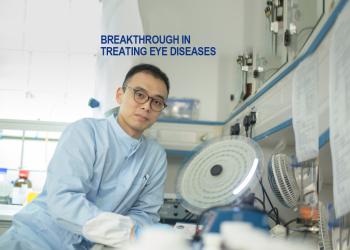
News
Breakthrough in Eye Diseases
A team formed by HKUST biomaterial researchers develops the world’s first injectable hydrogel formulation that allows a long, sustainable release of protein therapeutics which can be used to treat eye diseases like macular degeneration and diabetic retinopathy. Nowadays, patients with these diseases have to be treated by monthly injection for years, which is far from an ideal treatment regime.
Team member Yu Yu, a postdoctoral fellow in Biomedical Engineering at HKUST, said: “Drugs formulated with our novel hydrogel material could be injectable as usual but release slowly from the depot, potentially providing effective long lasting treatment on patients.”
The hydrogel formulation is set to be injected only once per year, sparing patients from having to endure monthly injections. This helps cut down medical expenses and lower the risk associated with repeated injections, Prof. Ying Chau, Associate Professor form Biomedical Engineering at HKUST added.
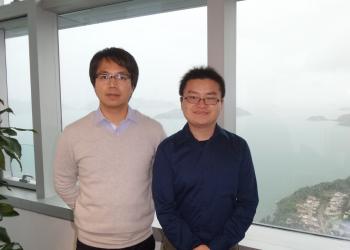
News
HKUST Theoretical Physicists Solve the Puzzle of Ising Superconductivity
A research team led by Prof Vic Kam Tuen Law, Assistant Professor of the Department of Physics at the Hong Kong University of Science and Technology (HKUST), gave an explanation to the complex phenomenon of superconductivity that survives under strong magnetic field, offering a theoretical answer to an unsolved experimental observation by a group of scientists in the Netherlands. The collective findings were published in Science on 12 November 2015.
Superconductivity is a quantum phenomenon in which electrons form pairs and flow with zero resistance. However, strong enough magnetic field can break electron pairs and destroy superconductivity. When informed by researchers from the Netherlands that superconductivity in thin films of MoS2 could withstand an applied magnetic field as strong as 37 Tesla, Prof Law and his student Mr Noah Yuan came up with an explanation and solved the puzzle.








